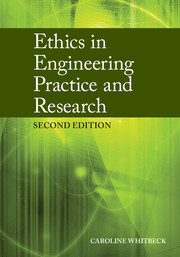Book contents
- Frontmatter
- Contents
- Note to Students
- Foreword to the First Edition
- Preface to the First Edition
- Acknowledgment
- Acknowledgments to the First Edition
- Part 1 Values and the Evaluation of Acts in Engineering
- Part 2 Engineering Responsibility
- Part 3 Responsible Research Conduct
- Part 4 The Future of Engineering
- 10 Responsibility for the Environment
- 11 A Note on End Use and ???Macro??? Issues
- Epilog: Making a Life in Engineering
- References
- Index
Epilog: Making a Life in Engineering
Published online by Cambridge University Press: 05 June 2012
- Frontmatter
- Contents
- Note to Students
- Foreword to the First Edition
- Preface to the First Edition
- Acknowledgment
- Acknowledgments to the First Edition
- Part 1 Values and the Evaluation of Acts in Engineering
- Part 2 Engineering Responsibility
- Part 3 Responsible Research Conduct
- Part 4 The Future of Engineering
- 10 Responsibility for the Environment
- 11 A Note on End Use and ???Macro??? Issues
- Epilog: Making a Life in Engineering
- References
- Index
Summary
We have examined many aspects of professional responsibility for engineers and scientists. Many aspects of moral life lie outside considerations of professional responsibility. Family responsibility and general civic responsibility are two other major areas of moral responsibility that clearly lie outside the scope of considerations of this book. What about the choice of work in engineering and science? Such decisions are made within the context of many other decisions, including family obligations. For example, family obligations may restrict the geographical region in which you seek work. Practical considerations such as the need to pay back education loans also influence job choices. The choice of work is more intimately connected to professional ethics, because it significantly influences the opportunities for expressing one's values in one's work. Work that fulfills one's aspirations as well as ambitions and need for income is a major element in a meaningful life. How does one find opportunities to do such work? This is a problem, indeed a design problem, that a person addresses many times in a life, if at all. (I say “If at all,” because many people in the world today and throughout human history have had little opportunity to pursue many aspirations in their work life beyond providing subsistence to themselves and their families.)
The current range of possibilities for a young adult with talent in engineering or science may itself be daunting, and it would only add to that burden to attempt to catalog the value dimensions of work choice. In any case, I am reluctant to do so, because I have too often seen humanists and social scientists much more ready to instruct engineers and scientists about the goals they should pursue than to consider the social implications of their own work in humanities and social science.
- Type
- Chapter
- Information
- Ethics in Engineering Practice and Research , pp. 383 - 388Publisher: Cambridge University PressPrint publication year: 2011



